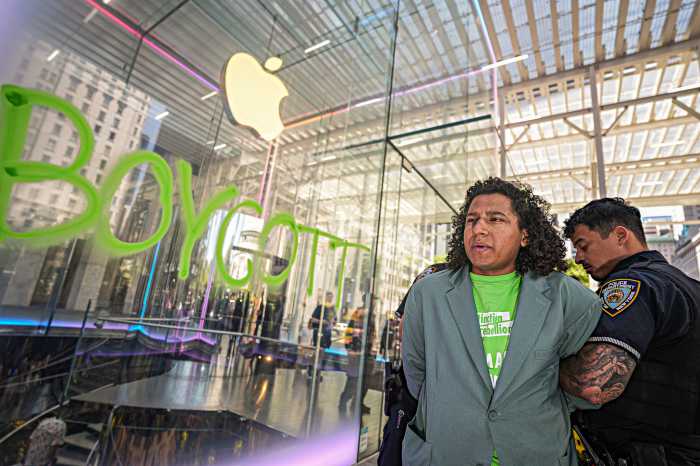Bill Boosts Contract Availability For Women-Owned Biz
Sen. Kirsten Gillibrand and Rep. Grace Meng, along with State Sen. Toby Stavisky and Assemblywoman Nily Rozic, urged the U.S. Senate to pass federal legislation that would expand access and opportunities for women-owned small businesses (WOSBs) seeking federal contracts.
This legislation would help level the playing field for hundreds of City WOSBs who want to access the sizeable market of federal contracts.
Women-owned businesses are one of the fastest growing sectors of the economy-nearly 30 percent of all Queens firms are owned by women, according to the latest Census data-but they are systemically shortchanged in terms of being able to access the market of government contracting.
More than two decades ago, Congress set a goal of awarding 5 percent of federal contracts to women-owned small businesses. Last year, nationwide, women-owned small businesses once again fell short of that goal with only 4.3 percent of contracts awarded. Across New York City, it was even lower, according to data from Women Impacting Public Policy (WIPP), at 1.48 percent of all federal contract dollars.
If women-owned businesses had received the existing 5 percent goal, Gillibrand stated, city women-owned small businesses would have grown their revenue by approximately $56 million dollars.
Gillibrand and Meng are pushing for legislation, called the Women’s Small Business Procurement Parity Act, which aims to close the gap for WOSBs by helping them tap into opportunities for growth and job creation. The legislation would provide tools that are already available to other small business contracting programs. The House of Representatives passed a similar amendment earlier this spring.
“Small businesses are the backbone of our economy and the most powerful job creators we have,” Gillibrand said. “And the fact is, women are the primary income earner for a growing share of homes across America. The key to a growing economy, and the key to an American middle class that is built to thrive in the 21st century is women. When we equip more Queens women entrepreneurs with the access and opportunities to achieve their best in the economy, and their best for their family, that’s when America’s middle class will thrive again. Without a doubt, if given a fair shot, womenowned businesses will help grow our economy.”
“Small businesses are what drive the economy here in Queens and across the nation; and women-owned companies play a major role in making it prosper,” added Meng. “It’s time to knock down the barriers that for too long have blocked female entrepreneurs from doing more business with the federal government. Women-owned businesses have just as much right to federal contracts as all other businesses do.”
“Women already struggle for equal pay, they deserve a fair opportunity when seeking federal contracts. When our mothers, wives and daughters succeed, we all do,” Stavisky said.
“Equal opportunity for women entrepreneurs is crucial to maintaining small businesses and the growth of our economy,” said Rozic. “With more women entering the workforce and often becoming the primary source of income, we must provide them with the resources they need to ensure success. This legislation would improve the lives of Queens women who own small businesses and encourage young women to start businesses of their own.”
“We applaud Senator Gillibrand and Congresswoman Meng for helping women owned businesses in our community so that they receive essential resources for their businesses to succeed,” said LaGuardia Community College President Dr. Gail Mellow. “With this legislation, women entrepreneurs will have additional opportunities for their businesses to grow and secure government contracts.”
According to a recent report, 8.6 million small businesses are owned by women, with an estimated economic impact of $3 trillion and supporting 23 million jobs nationwide. In the New York City metropolitan area alone, an estimated 670,000 businesses are owned by women-more than a 30 percent increase since 1997-but city women-owned small businesses secured only 1.48 percent of federal contract dollars through city firms, according to the Women Impacting Public Policy (WIPP).
Currently, there are nearly 350 women-owned businesses citywide, including dozens of Queens small businesses, who are certified under SBA’s WOSB Federal Contract Program. Launched in 2011, the program is restricted by the type and size of contracts awarded. For example, it lacks access to solesource contracts and represents only a small share of federal contracts.
The Women’s Small Business Procurement Parity Act would expand more opportunities for WOSBs by providing women-owned businesses access to sole-source contracts. Removing the sole-source authority restriction on the WOSB procurement program would allow hundreds of city women-owned businesses to become eligible for contracts when federal agencies need urgent action and consider just one company for a job.
Currently, all other major small business contracting programs, such as for minority owned businesses, businesses in underserved communities, and the service disabled veterans program, have solesource authority with the only exception being the WOSB procurement program. This legislation would help level the playing field for women small business owners.
Gillibrand’s legislation would also expedite an important study that identifies specific industries where women are underrepresented to shed light on why the 5 percent benchmark has never been achieved. Last year, only 4.3 percent of federal contracts were awarded to WOSBs, which is the closest the federal government has come to reaching its existing goal, according to the Small Business Administration (SBA). Nationwide, failure to meet this goal costs women-owned businesses nearly $5.7 billion in government contracts each year, according to a recent Congressional report.
The proposal, which has the support of multiple national women’s business and small business organizations, is part of a larger comprehensive measure called the Women’s Small Business Ownership Act of 2014, which would expand SBA micro-loan and intermediary lending programs to reach more women borrowers and bolster counseling and business training for women entrepreneurs, particularly in underserved areas.



































